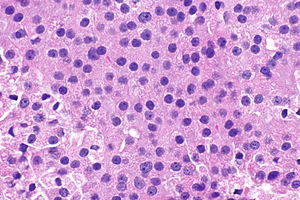Hürthle cell neoplasm

Micrograph showing a (metastatic) Hürthle cell carcinoma. H&E stain.
Hürthle cell neoplasm is a rare tumour of the thyroid gland that can have a benign or malignant behaviour. They are generally considered a subset of follicular neoplasm,[1][2] which includes follicular thyroid carcinoma and follicular thyroid adenoma.
It may be referred to as oncocytic neoplasm.
Hürthle cell carcinoma and Hürthle cell adenoma redirect to here.
General
- Incidence: uncommon.
- This is a general category - includes:
- Hürthle cell adenoma.
- Hürthle cell carcinoma.
- Some advocate total thyroidectomy for all Hürthle cell neoplasms, as it is difficult to reliably differentiate adenomas and carcinomas.[3]
- It can be understood as a special type of follicular neoplasm (including follicular thyroid adenoma and follicular thyroid carcinoma).[4]
- High stage HCC has a poor prognosis.[5]
Adenoma versus carcinoma
Suggestive for carcinoma:[3]
- Male.
- >4 cm.
- Adenomas usu. <3 cm.
Definite for carcinoma:[3]
- Lymphovascular invasion.
- Capsular invasion.
Risk of malignancy by tumour size
Risk of malignancy by size - based on a series of 57 cases:[6]
| Size | Percentage malignant |
|---|---|
| <=1 cm | 17% |
| 1-4 cm | 23% |
| >4 cm | 65% |
Gross
- Yellow.
- Encapsulated.
Microscopic
Features:[4]
- Oncocytes >= 75% of cells:
- Abundant granular, eosinophilic cytoplasm.
- Round regular nucleus +/- prominent nucleolus.
- +/-Degenerative changes.
Negatives:
- Lack nuclear features of papillary thyroid carcinoma.
- Lack features of medullary thyroid carcinoma.
DDx:[7]
- Papillary thyroid carcinoma oncocytic variant.
- Medullary thyroid carcinoma oncocytic variant.
- Others.
Images
IHC
Features:
- TTF-1 +ve (2 of 6 cases in Bejarno et al.,[8] or 6 of 6 cases in Choi et al.[9]).
- Thyroglobulin (6 of 6 cases[8]).
- CK7 (4 of 6 cases[8]).
- HBME-1 +ve (focal in 4 of 6 cases[9]).
- HCK -ve (6 of 6 cases[9]).
- CK19 +ve (focal in 4 of 6 cases[9]).
See also
References
- ↑ Wei, S.; LiVolsi, VA.; Montone, KT.; Morrissette, JJ.; Baloch, ZW. (Dec 2015). "PTEN and TP53 Mutations in Oncocytic Follicular Carcinoma.". Endocr Pathol 26 (4): 365-9. doi:10.1007/s12022-015-9403-6. PMID 26530486.
- ↑ Ustun, B.; Chhieng, D.; Van Dyke, A.; Carling, T.; Holt, E.; Udelsman, R.; Adeniran, AJ. (Jul 2014). "Risk stratification in follicular neoplasm: a cytological assessment using the modified Bethesda classification.". Cancer Cytopathol 122 (7): 536-45. doi:10.1002/cncy.21425. PMID 24753500.
- ↑ 3.0 3.1 3.2 Wasvary, H.; Czako, P.; Poulik, J.; Lucas, R. (Aug 1998). "Unilateral lobectomy for Hurthle cell adenoma.". Am Surg 64 (8): 729-32; discussion 732-3. PMID 9697901.
- ↑ 4.0 4.1 Thompson, Lester D. R. (2006). Endocrine Pathology: A Volume in Foundations in Diagnostic Pathology Series (1st ed.). Churchill Livingstone. pp. 104. ISBN 978-0443066856.
- ↑ Chindris, AM.; Casler, JD.; Bernet, VJ.; Rivera, M.; Thomas, C.; Kachergus, JM.; Necela, BM.; Hay, ID. et al. (Jan 2015). "Clinical and molecular features of Hürthle cell carcinoma of the thyroid.". J Clin Endocrinol Metab 100 (1): 55-62. doi:10.1210/jc.2014-1634. PMID 25259908.
- ↑ Chen, H.; Nicol, TL.; Zeiger, MA.; Dooley, WC.; Ladenson, PW.; Cooper, DS.; Ringel, M.; Parkerson, S. et al. (Apr 1998). "Hürthle cell neoplasms of the thyroid: are there factors predictive of malignancy?". Ann Surg 227 (4): 542-6. PMID 9563543.
- ↑ Montone KT, Baloch ZW, LiVolsi VA (August 2008). "The thyroid Hürthle (oncocytic) cell and its associated pathologic conditions: a surgical pathology and cytopathology review". Arch. Pathol. Lab. Med. 132 (8): 1241–50. PMID 18684023.
- ↑ 8.0 8.1 8.2 Bejarano, PA.; Nikiforov, YE.; Swenson, ES.; Biddinger, PW. (Sep 2000). "Thyroid transcription factor-1, thyroglobulin, cytokeratin 7, and cytokeratin 20 in thyroid neoplasms.". Appl Immunohistochem Mol Morphol 8 (3): 189-94. PMID 10981870.
- ↑ 9.0 9.1 9.2 9.3 Choi, YL.; Kim, MK.; Suh, JW.; Han, J.; Kim, JH.; Yang, JH.; Nam, SJ. (Oct 2005). "Immunoexpression of HBME-1, high molecular weight cytokeratin, cytokeratin 19, thyroid transcription factor-1, and E-cadherin in thyroid carcinomas.". J Korean Med Sci 20 (5): 853-9. PMID 16224162.



